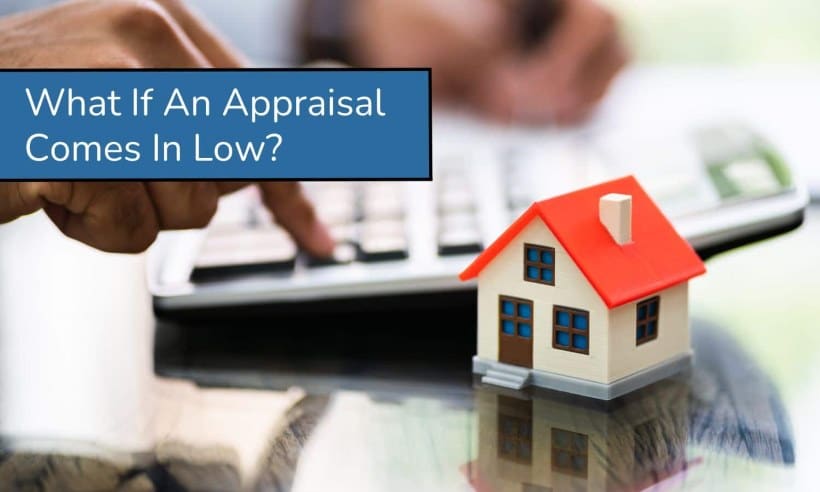If you’re selling your house, your top priority is usually getting the highest possible amount of money. But what if the appraisal ends up being lower than the offer you received?
A low appraisal can be a real headache for both the seller and the buyer. It can cause delays in the closing process and, in the worst case, even lead to the sale falling through completely. Surprisingly, low appraisals happen more frequently than you might expect. However, they don’t necessarily have to be a deal breaker.
That’s why it’s crucial to be prepared if you’re selling your house. So we’ll cover the basics of home appraisals and the factors that can affect your home’s value. We’ll also explore common reasons why appraisals come in low and provide valuable tips to help you prevent such situations.
By the end, you’ll have an understanding of the process and be confident in navigating the sale of your home.

What is a home appraisal?
When you’re selling your home, it’s highly likely that you’ll need to have it appraised. A home appraisal is an assessment of your property’s value conducted by a licensed appraiser. To determine the fair market value of your home, the appraiser considers various factors.
The appraisal process involves a comprehensive inspection of your entire home as well as an examination of the neighborhood. Using this information, the appraiser compares your home to similar properties in the area. They take into account recent sales and prevailing market trends.
Several factors can influence the appraisal value of your home. Your home’s condition, its size, layout, and any improvements you’ve made can all have an impact on its value. Additionally, factors such as the neighborhood, location, and proximity to amenities like schools and shopping centers can affect the appraisal value.
The appraiser plays a vital role in the home selling process. Lenders rely on their appraisal report to determine the amount they’re willing to lend to potential buyers. A low appraisal can create challenges for buyers in securing financing, which can, in turn, affect the sale of your home.
To ensure a fair and accurate appraisal, it is crucial to work with a reputable appraiser. One who understands the local real estate market and has experience in appraising homes in your area. By doing so, you can increase the likelihood of obtaining the best possible price when selling your home.
What can cause a low appraisal?
Of course homeowners hope for a high value. However, there are several reasons why a home appraisal might come in lower than expected. Understanding these reasons can help you prepare for the appraisal and take proactive steps to mitigate potential issues.
One common reason for a low appraisal is the condition of the home, which may seem obvious. If your home is in poor condition or requires significant repairs, the appraiser is likely to assign a lower value. Outdated features or design elements that make the home less appealing to buyers can also contribute to a lower appraisal.
Market conditions and location are also influential factors in the appraisal value. If your home is located in an area with high inventory and low demand, the appraiser may assign a lower value. Similarly, if your home is situated in an area with high crime rates, it can negatively impact the appraisal.
Inaccurate property information or the use of incorrect comparables during the valuation process can also result in a low appraisal. It’s crucial to carefully review the appraisal report and address any inaccuracies or discrepancies with the appraiser. This highlights the importance of working with an experienced appraiser who possesses knowledge of the local market.

What can be done about a low appraisal?
Receiving a low home appraisal can be disappointing. But it’s essential to keep in mind that it’s not the end of the world. There are several steps you can take if your home appraisal comes in lower than expected.
First and foremost, carefully review the appraisal report for any errors or omissions. If you believe the appraiser made a mistake, you can request a reconsideration or appeal the appraisal. However, it’s important to note that these processes can be time-consuming. And it may not always result in a higher appraisal value.
If disputing the appraisal isn’t an option, there are still alternatives to explore. One option is to work closely with your real estate agent to negotiate with the buyer or their lender. Depending on the circumstances, the buyer might be willing to cover the appraisal gap from their own funds. In some cases, the lender may also consider approving a higher loan amount to bridge the gap.
Another option is to consider making improvements to your home to increase its value. This could involve addressing repairs, upgrading outdated features, or fixing any maintenance issues. However, it’s important to note that these improvements can be both costly and time-consuming. Additionally, there’s no guarantee that they will result in a significant increase in the appraisal value.
Lastly, you may need to carefully consider lowering your asking price or walking away from the sale. We understand that this decision can be challenging to make. However, it’s crucial to remember that selling your home at a fair price is ultimately in your best interest.
By considering these options and working closely with trusted real estate professionals, you can make informed decisions.
Remember…
It’s crucial to remember that the buyer initially expressed interest in your house before the appraisal. Unless significant issues are discovered, it’s likely that their interest remains intact.
If outdated design elements or a lack of amenities weren’t concerns before, they are unlikely to become deal-breakers afterward. In many cases, buyers will still be willing to proceed with the offer price. At the very least, they will be open to negotiations.

Tips to avoid a low appraisal
Unfortunately, you can’t control all the factors that influence a home appraisal. However, there are steps you can take to increase your chances of receiving a fair and accurate valuation. Here are some tips to help prevent a low appraisal:
- Research the market: Before listing your home, do your research to understand the current market conditions in your area. This can help you set a realistic asking price and provide valuable information to the appraiser.
- Make repairs and upgrades: Address any maintenance issues and make necessary repairs to ensure your home is in good condition. Consider making upgrades that will increase the value of your home, such as updating your kitchen or bathroom or even the curb appeal.
- Declutter and clean: A clean and clutter-free home can help make a good impression. It will highlight your home’s best features. Staging your home isn’t just to prepare for home showings.
- Keep records of improvements: Keep records of any repairs or upgrades you’ve made to your home, including receipts and invoices. This can help demonstrate the value of these improvements to the appraiser.
- Be present: Be there during the appraisal to answer any questions and provide additional information about your home.
- Provide comparables: Work with your real estate agent to provide the appraiser with recent sales of comparable homes in your area. This can help ensure the appraiser is using accurate data in their valuation.
- Don’t overprice your home: We know it’s tempting to set a high asking price. But an overpriced home is less likely to appraise for its full value. Work with your real estate agent to set a realistic asking price based on market conditions and recent sales data.
By taking these steps, you can help increase your chances of a fair and accurate home appraisal. Working with your agent and being proactive in preparing your home for the appraisal can help ensure a successful sale.
The bottom line
While receiving a low appraisal can be discouraging, it’s important to remember that it’s not always a dealbreaker. There are strategies to still close the deal and even secure the full offer price. Being informed and prepared for the appraisal process is key.
If you’re in the Tri-Cities area and are looking for a trusted team to guide you through the appraisal process, the Kenmore Team is here for you. We serve the local community with expertise and dedication.
Don’t let a low appraisal derail your plans to sell your home. Contact us today to learn how we can help you achieve your Tri-Cities real estate goals!

